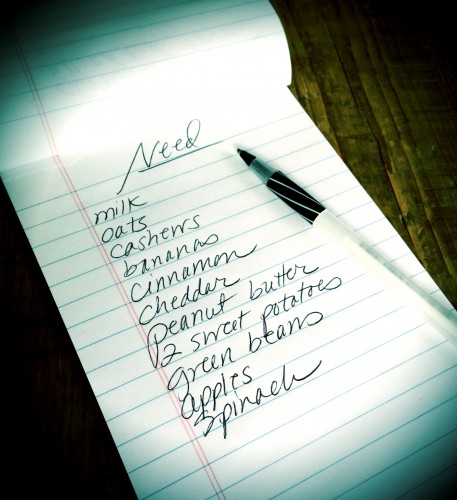 We always keep a shopping list in the kitchen. It’s a long notepad with a nifty little magnet on the back, which allows us to post it on Fridgey’s door. You remember Fridgey, don’t you? He’s our refrigerator. No, we’re not loony, just sentimental; and we’re telling you about our shopping list to illustrate an important characteristic of our Lord.
We always keep a shopping list in the kitchen. It’s a long notepad with a nifty little magnet on the back, which allows us to post it on Fridgey’s door. You remember Fridgey, don’t you? He’s our refrigerator. No, we’re not loony, just sentimental; and we’re telling you about our shopping list to illustrate an important characteristic of our Lord.
We keep our list handy, posted where we can easily see it, and we frequently update it. Whenever we’re cooking and notice we’re getting low on sugar or milk or what have you, we immediately add it to our evergrowing list. We learned a long time ago that if we don’t write it down while we’re thinking about it, we may forget it altogether. When we shop for groceries we want to make it count. We don’t want to come home without everything we needed. So before we go to the market, we grab our list containing all the stuff we jotted down during the week. Because nothing is more aggravating than coming home, putting away the groceries, and then starting dinner only to realize we FORGOT the oregano for the spaghetti sauce! When something like that happens, because sometimes we do forget to write down an item on our list, we either have to make an extra trip to the market, wasting time and gas, or change our menu plans.

We’ve gotten pretty good at updating our list, though. So we don’t usually forget what we need. But we gotta have our list! And guess what? God keeps a list, too! What’s God need a list for? So He will remember what He needs. What could God possibly need? He needs us! He created us to have fellowship with Him, and that’s exactly what He wants. In a manner of speaking, we’re on God’s shopping list. In Luke 10:20, the “Great Physician” proclaims to anyone who puts his or her faith in Christ, “Rejoice, because your names are written in heaven.” (KJB)
God has His own list, and He will never forget us. God keeps close track of His list, jotting down our names, constantly remembering us: “…I have written your name on the palms of my hands.” (Isaiah 49:16 NLT) Think about it for a moment: when someone really wants to remember something, like an important phone number, they often write it on their  hand. It’s safer than a piece of paper, which can get misplaced. And when something’s written on your hand, you’re definitely going to see it … repeatedly!
hand. It’s safer than a piece of paper, which can get misplaced. And when something’s written on your hand, you’re definitely going to see it … repeatedly!
Bottom line: God has not forgotten you and He never will! He’s got a list. Ask Him to put your name on it.
“…This is what the Lord says, the One who created you … ‘Do not be afraid, because I’ve redeemed you. I’ve called you by name; you are Mine.'” (Isaiah 43:1 ISV)

 Meatballs! Swedish, Italian, or sweet ’n’ sour — we love them all! And there are so many wonderful ways we can use them! Spaghetti and meatballs, meatball subs, meatballs sliced and layered in lasagna, tiny meatballs on toothpicks as appetizers….
Meatballs! Swedish, Italian, or sweet ’n’ sour — we love them all! And there are so many wonderful ways we can use them! Spaghetti and meatballs, meatball subs, meatballs sliced and layered in lasagna, tiny meatballs on toothpicks as appetizers…. e was amazed that we had it down to a science: but no real measuring; we’d just guesstimate the portions and roll them each into an almost perfect ball — quickly and efficiently — placing the nearly uniform meatballs on a large tray. We were like potters working with clay, molding, shaping, creating little culinary ornaments.
e was amazed that we had it down to a science: but no real measuring; we’d just guesstimate the portions and roll them each into an almost perfect ball — quickly and efficiently — placing the nearly uniform meatballs on a large tray. We were like potters working with clay, molding, shaping, creating little culinary ornaments. Are you allowing God to mold you? Are you soft, flexible, pliable, willing to place yourself into the hands of the Master? To be good clay (or ground beef), we must be teachable, willing to learn from God, the Bible, or anyone who shares a truth with us. To be flexible, we need to be receptive to new ideas (as long as they don’t countermand God’s sovereign Word). To be pliable, we need to be willing to surrender to God’s will, and give up our “right to be right.” (We can’t expect to get every thing our way!)
Are you allowing God to mold you? Are you soft, flexible, pliable, willing to place yourself into the hands of the Master? To be good clay (or ground beef), we must be teachable, willing to learn from God, the Bible, or anyone who shares a truth with us. To be flexible, we need to be receptive to new ideas (as long as they don’t countermand God’s sovereign Word). To be pliable, we need to be willing to surrender to God’s will, and give up our “right to be right.” (We can’t expect to get every thing our way!)